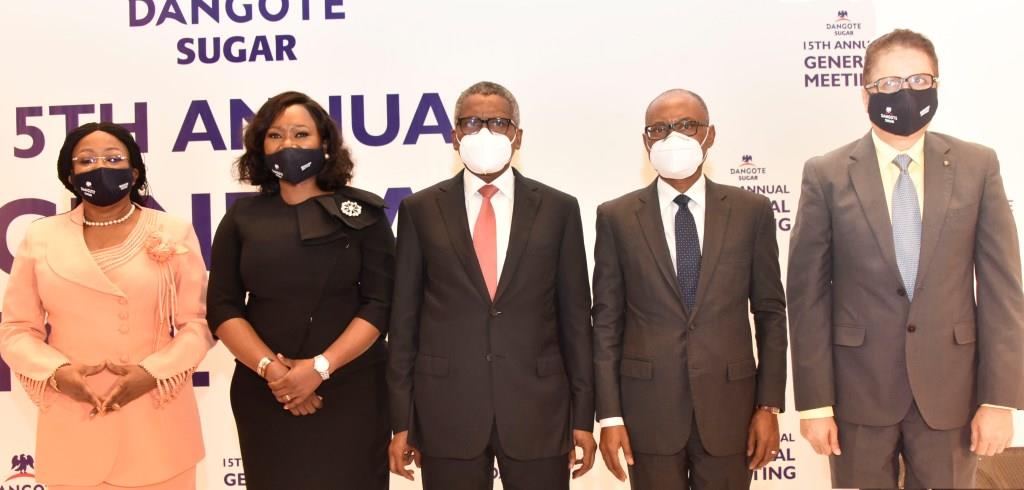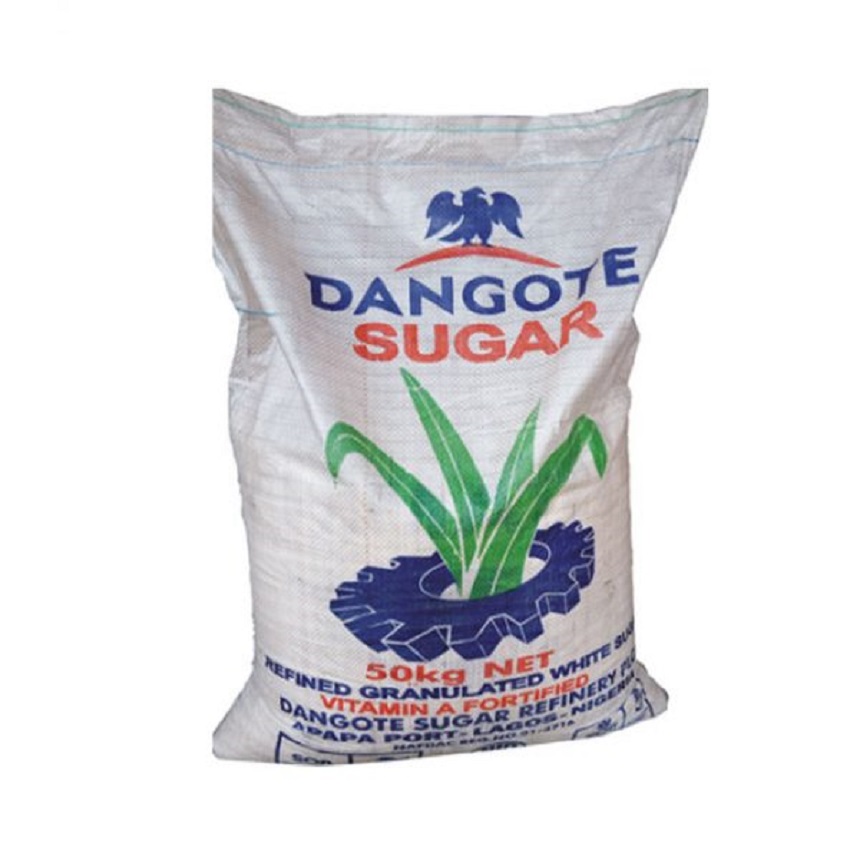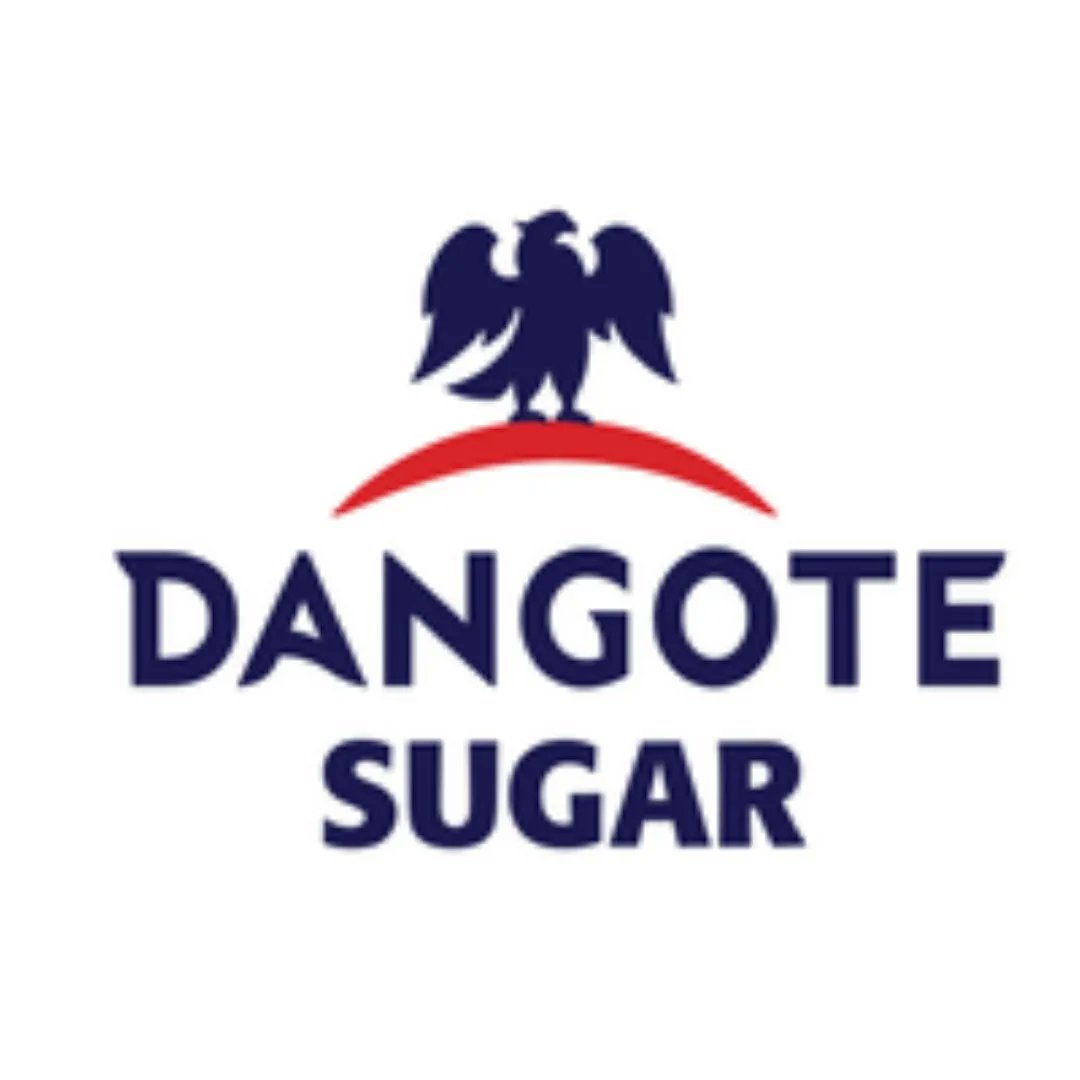Economy
Distorting Sugar Master Plan Dangerous to Economy—Dangote

By Dipo Olowookere
The federal government has been urged to fully implement its Backward Integration Policy (BIP) in the sugar industry because the country stands to gain a lot from it.
The Chairman of Dangote Sugar Refinery, Mr Aliko Dangote, while speaking at the 15th Annual General Meeting (AGM) of the firm in Lagos, noted that Nigeria could rake in foreign exchange up to $700 million yearly from the scheme.
He warned that allowing for distortions in the sugar master plan framework could adversely affect the target of the nation attaining self-sufficiency as projected, noting that it will not only reduce imports of raw sugar but save the nations enormous foreign exchange used for importation.
“If the national sugar master plan is followed strictly and the players all follow the rules, the country will be better for it as Nigeria will save between $600 million and $700 million annually as forex,” he said.
Mr Dangote said the backward integration policy of Dangote Sugar was recording appreciable progress even as he declared the company’s irrevocable commitment to the policy.
Addressing the shareholders, he opined that despite the disruptions in the economy occasioned by the COVID-19 pandemic, the company announced an increase in production volume which rose by 13.7 per cent to 743,858 tonnes in the financial year ended December 31, 2020, compared to 654,071 tonnes in 2019.
He stated that the sugar refiner posted a turnover of N214.3 billion, a 33 per cent increase over the N161.1 billion in 2019, while in the same period, it also posted a 6.9 per cent increase in sales volume from 684,487 tonnes in 2019 to 731,701 tonnes in 2020.
Therefore, the board of the company declared a dividend payment of N18.2 billion to the shareholders, amounting to N1.50 per ordinary share of 50 kobo each.
According to Mr Dangote, the improvements were attributable to operations optimisation strategy despite the disruption caused by civil unrest in the last quarter of the year.
“Our growth continued to benefit from the sustained efforts to drive customer base expansion and several trade initiatives and investments,” he disclosed.
Gross profit increased by 40.4 per cent to N53.8 billion compared to N38.3 billion in 2019 while the profit after taxation for the year increased by 33.2 per cent to N26.7 billion as against N22.4 billion in 2019, reflecting management’s unrelenting goal to deliver consistent shareholder value.
The businessman said the company has revised its sugar production target to 550,000 metric tonnes achievable by 2024 in line with the revised plan on the BIP by the federal government.
In his remarks, the Group Managing Director/Chief Executive Officer, Mr Ravindra Singhvi, speaking on the results, said the sugar group continued the growth path with commitments to improve performance and generate value for all stakeholders.
He explained that this was reflected in the sales volume delivery of 731,701 tonnes, and production of 743,858 tonnes being 6.9 per cent and 13.7 per cent increase in volumes over the comparative year 2019.
He said the organisation would ensure all hands are on deck to meet the targeted 550,000 tonnes projected to be achieved by 2024.
“Our Backward Integration goal is to become a global force in sugar production, by producing 1.5M MT/PA of refined sugar from locally grown sugar cane for the domestic and export markets,” he said.
According to him, “our focus on the implementation of our key strategies in the face of the several challenges posed by the COVID Pandemic, the peculiarities of the Apapa traffic situation amongst others we achieved a topline growth in revenue of N214.3 billion, a 33.0 per cent increase over 2019; a 53 per cent YOY increase in PBT, and 33.2 per cent increase in PAT.
“2020 was indeed very eventful for our company ranging from the weak macroeconomic fundamentals caused by the underlying impact of COVID-19 pandemic which saw to the steady rise in forex rate, high inflation and the significant rise in our cost of production, to the worsening traffic gridlock on the Apapa Wharf Road which led to delays and at times disruption of the distribution and deliveries to customers.”
He noted that one of the key highlights during the year was the successful completion of the merger of Dangote Sugar Refinery Plc (DSR) and Savannah Sugar Company Limited (SSCL) with effect from September 1, 2020, to operate under one unified entity.
He added, “We are confident the merger will enable us to achieve operational, administrative and governance efficiencies resulting in increased shareholder value. We will continue to pursue our Backward Integration Projects, and other key initiatives to grow our sales volumes, market share, optimize cost and operational efficiencies.
Also speaking, Dr Farouk Umar, President, Association for the Advancement of the Rights of Nigerian Shareholders commended the management of Dangote Sugar for the impressive performance of the company despite the hiccups in the year 2020.
He said the shareholders expect more robust results next year since the economy is already picking up and for them to have performed excellently under pandemic, then next year will be greater for us all. The leadership of the company has been very wonderful.”
Commenting in the same vein, Coordinator, Independent Shareholders Association, Mr Sunny Nwosu, said the management of Dangote Sugar led by Dangote has never let the shareholders down for once “their management style is second to none and that is why the company has been growing steadily.
He said the way and manner the Company has been executing its BIP projects was also commendable as this will afford the Company opportunity to meet the target within its projected timelines.
Dangote Sugar Refinery is Nigeria’s largest producer of household and commercial sugar with 1.44M MT refining capacity at the same location. Our refinery located at Apapa Wharf Ports Complex, refines raw sugar imported from Brazil to white, Vitamin A fortified refined granulated white sugar suitable for household and industrial uses.
To achieve this, Dangote Sugar Refinery Plc acquired Savannah Sugar Company Limited, located in Numan, Adamawa State in December 2012, and embarked on the ongoing rehabilitation of its facilities and expansion of its 32,000 hectares’ sugarcane estate.
In September 2020, the scheme of merger between DSR and Savannah Sugar estate was completed which gave birth to a bigger and stronger business with considerable opportunity for growth and delivery of superior benefits to all stakeholders.
The expansion and rehabilitation of the sugar estate is still ongoing as well as the development of the greenfield site acquired at Tunga, Nasarawa State for the achievement of DSR’s sugar for Nigeria development master plan.
The Nasarawa Sugar Company Limited is the registered subsidiary of Dangote Sugar Refinery Plc. The 78,136 hectares Sugar Project Site is located at Tunga, Awe Local Government Area, of Nasarawa State. Massive developments in agriculture, irrigation infrastructure amongst others is ongoing at the site.
Unfortunately, Lau/Tau project is still on hold following the lingering compensation issue between the communities and the Taraba State government.
Economy
Seven Price Gainers Boost NASD OTC Bourse by 2.19%

By Adedapo Adesanya
Seven price gainers flipped recent declines at the NASD Over-the-Counter (OTC) Securities Exchange, raising the alternative stock market by 2.19 per cent on Friday.
According to data, the market capitalisation added N51.24 billion to end N2.389 trillion compared with the previous day’s N2.338 trillion, while the NASD Unlisted Security Index (NSI) climbed 85.65 points to close at 3,994.32 points, in contrast to the 3,908.67 points it ended a day earlier.
Business Post reports that the advancers were led by MRS Oil Plc, which improved its value by N13.00 to N200.00 per share from N187.00 per share, FrieslandCampina Wamco Nigeria Plc gained N7.40 to settle at N91.55 per unit versus the previous day’s N84.15 per unit, Central Securities Clearing System (CSCS) Plc appreciated by N6.08 to N71.00 per share from N64.92 per share, Afriland Properties Plc added 66 Kobo to finish at N17.17 per unit versus N16.51 per unit, IPWA Plc rose 37 Kobo to N4.15 per share from N3.78 per share, First Trust Mortgage Bank Plc grew by 11 Kobo to N1.20 per unit from N1.09 per unit, and Food Concepts Plc went up by 10obo to N3.70 per share from N3.60 per share.
On the flip side, there were two price losers led by Geo-Fluids Plc, which depreciated by 28 Kobo to N3.32 per unit from N3.60 per unit, and Industrial and General Insurance (IGI) Plc dropped 5 Kobo to sell at 45 Kobo per share from 50 Kobo per share.
Yesterday, the volume of trades went down by 92.0 per cent to 3.7 million units from 45.8 million units, the value of transactions fell by 59.4 per cent to N84.5 million from N208.2 million, while the number of deals went up by 7.7 per cent to 42 deals from 39 deals.
CSCS Plc remained the most traded stock by value (year-to-date) with 32.6 million units exchanged for N1.9 billion, trailed by Geo-Fluids Plc with 119.6 million units valued at N470.3 million, and Resourcery Plc with 1.05 billion units traded at N408.6 million.
Resourcery Plc closed the day as the most traded stock by volume (year-to-date) with 1.05 billion units sold for N408.7 million, followed by Geo-Fluids Plc with 119.6 million units worth N470.3 million, and CSCS Plc with 32.6 million units worth N1.9 billion.
Economy
FX Demand Worries Weaken Naira to N1,346/$1 at Official Market

By Adedapo Adesanya
The Naira weakened further against the United States Dollar in the Nigerian Autonomous Foreign Exchange Market (NAFEX) on Friday, February 20, by N4.97 or 0.37 per cent to N1,346.32/$1 from the N1,341.35/$1 it was transacted on Thursday.
Heightened FX demand tilted the market toward the downside yesterday, exerting upward pressure on rates despite efforts by the Central Bank of Nigeria (CBN) to stabilise the foreign exchange market.
Also in the official market, the domestic currency depreciated against the Pound Sterling during the session by N9.39 to sell for N1,815.25/£1 versus the previous day’s N1,805.86/£1, and lost N7.33 against the Euro to close at N1,584.62/€1 compared with the preceding session’s N1,577.29/€1.
The story was not different for the Nigerian Naira at the GTBank FX desk, where it depleted against the Dollar by N7 on Friday to quote at N1,356/$1 versus the N1,349/$1 it was sold a day earlier, but remained unchanged in the black market at N1,370/$1.
It was observed that risky sentiment among Foreign Portfolio Investors (FPIs) contributed to the FX market, amid fears of hot money flight due to capital gains tax and other factors.
As for the cryptocurrency market, it was mostly green yesterday in reaction to a Supreme Court verdict dismissing a fresh 10 per cent global levy by President Donald Trump.
The apex court on Friday described Mr Trump’s global tariff rollout as illegal. The decision did not clarify what should happen to tariff revenue already collected, and it doesn’t necessarily spell the end of the trade agenda, with multiple legal and executive avenues still available.
Litecoin (LTC) grew 2.7 per cent to $55.00, Cardano (ADA) appreciated 2.6 per cent to trade at $0.2815, Binance Coin (BNB) expanded by 2.6 per cent to $627.19, Dogecoin (DOGE) recouped 1.3 per cent to quote at $0.1, Ripple (XRP) jumped 0.7 per cent to $1.43, Solana (SOL) improved by 0.5 per cent to $84.15, and Ethereum (ETH) soared 0.1 per cent to $1,962.78.
However, Bitcoin (BTC) lost 0.2 per cent to sell for $67,850.49, while the US Dollar Tether (USDT) and the US Dollar Coin (USDC) traded flat at $1.00 each.
Economy
Fidson, Jaiz Bank, Others Keep NGX in Green Territory

By Dipo Olowookere
A further 0.99 per cent was gained by the Nigerian Exchange (NGX) Limited on Friday after a positive market breadth index supported by 53 price gainers, which outweighed 23 price losers, representing bullish investor sentiment.
During the trading day, the trio of Jaiz Bank, Fidson, and NPF Microfinance Bank chalked up 10.00 per cent each to sell for N11.00, N86.90, and N6.27, respectively, while Deap Capital appreciated by 9.96 per cent to N7.62, and Mutual Benefits increased by 9.94 per cent to N5.42.
Conversely, Secure Electronic Technology shed 10.00 per cent to trade at N1.62, Sovereign Trust Insurance slipped by 9.73 per cent to N2.32, Ellah Lakes declined by 7.91 per cent to N12.80, International Energy Insurance retreated by 5.56 per cent to N3.40, and ABC Transport moderated by 5.26 per cent to N9.00.
Data from Customs Street revealed that the insurance counter was up by 2.52 per cent, the industrial goods sector grew by 2.28 per cent, the banking space expanded by 1.43 per cent, the consumer goods index gained 1.23 per cent, and the energy industry rose by 0.05 per cent.
As a result, the All-Share Index (ASI) went up by 1,916.20 points to 194,989.77 points from 193,073.57 points, and the market capitalisation moved up by N1.230 trillion to N125.164 trillion from Thursday’s N123.934 trillion.
Yesterday, investors traded 820.5 million stocks valued at N28.3 billion in 63,507 deals compared with the 898.5 million stocks worth N38.5 billion executed in 61,953 deals, showing a jump in the number of deals by 2.51 per cent, and a shortfall in the trading volume and value by 8.68 per cent and 26.49 per cent apiece.
Closing the session as the most active equity was Mutual Benefits with 79.0 million units worth N427.1 million, Zenith Bank traded 44.0 million units valued at N3.8 billion, Chams exchanged 43.9 million units for N182.0 million, AIICO Insurance transacted 42.4 million units valued at N179.8 million, and Veritas Kapital sold 36.0 million units worth N90.6 million.
-

 Feature/OPED6 years ago
Feature/OPED6 years agoDavos was Different this year
-
Travel/Tourism10 years ago
Lagos Seals Western Lodge Hotel In Ikorodu
-

 Showbiz3 years ago
Showbiz3 years agoEstranged Lover Releases Videos of Empress Njamah Bathing
-

 Banking8 years ago
Banking8 years agoSort Codes of GTBank Branches in Nigeria
-

 Economy3 years ago
Economy3 years agoSubsidy Removal: CNG at N130 Per Litre Cheaper Than Petrol—IPMAN
-

 Banking3 years ago
Banking3 years agoSort Codes of UBA Branches in Nigeria
-

 Banking3 years ago
Banking3 years agoFirst Bank Announces Planned Downtime
-

 Sports3 years ago
Sports3 years agoHighest Paid Nigerian Footballer – How Much Do Nigerian Footballers Earn















